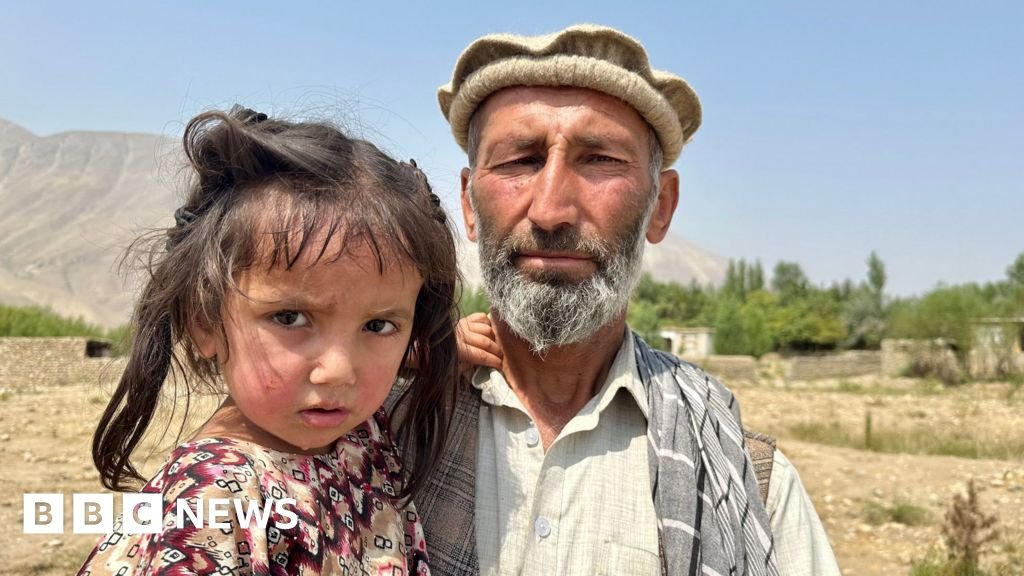Yogita LimayeSouth Asia and Afghanistan correspondent
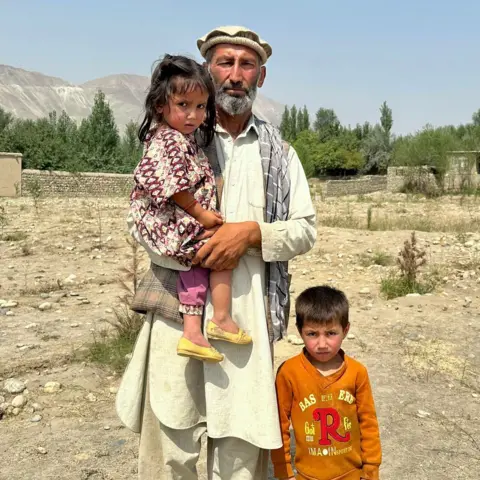 Aakriti Thapar / BBC
Aakriti Thapar / BBCWhen Shahnaz went into labour, her husband Abdul known as a taxi to take them to the one medical facility accessible to them.
“She was in so much ache,” he says.
A 20-minute drive away, the clinic was in Shesh Pol village in Afghanistan’s north-eastern Badakhshan province. It was the place their two older kids had been born.
Abdul sat subsequent to Shahnaz comforting her as they drove over gravel tracks to succeed in assist.
“However once we reached the clinic, we noticed that it was closed. I did not comprehend it had shut down,” he mentioned, his face crumpling with agony.
Warning: Readers might discover some particulars on this article distressing.
The clinic in Shesh Pol is one among greater than 400 medical services that closed down in Afghanistan, one of many world’s poorest international locations, after the Trump administration reduce almost all US support to the nation earlier this yr, in a drastic and abrupt transfer following the dismantling of the US Company for Worldwide Growth (USAID).
A single-storey construction with 4 small rooms, white paint peeling off its partitions, the Shesh Pol clinic has USAID posters tacked up all over the place with data and steering for pregnant girls and new moms.
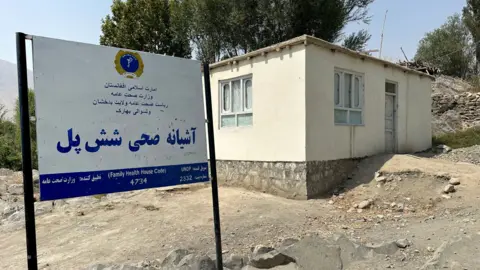 Aakriti Thapar / BBC
Aakriti Thapar / BBCIt does not appear like a lot however in Badakhshan’s mountainous, unforgiving terrain, the place an absence of entry has been a serious purpose for traditionally excessive maternal mortality charges, the clinic was a vital lifeline, a part of a wider programme carried out through the tenure of the US-backed authorities within the nation, to cut back maternal and new child deaths.
It had a educated midwife who assisted round 25-30 deliveries each month. It had a inventory of medicines and injections, and it additionally supplied fundamental healthcare companies.
Different medical services are just too removed from Abdul’s village, and it was not with out threat for Shahnaz to journey on bumpy roads. Abdul additionally did not have cash to pay for an extended journey – renting the taxi price 1,000 Afghani ($14.65; £12.70), roughly 1 / 4 of his month-to-month revenue as a labourer. In order that they determined to return residence.
“However the child was coming and we needed to cease by the facet of the street,” Abdul mentioned.
Shahnaz delivered their child woman within the automobile. Shortly after, she died, bleeding profusely. Just a few hours later, earlier than she may very well be named, their child additionally died.
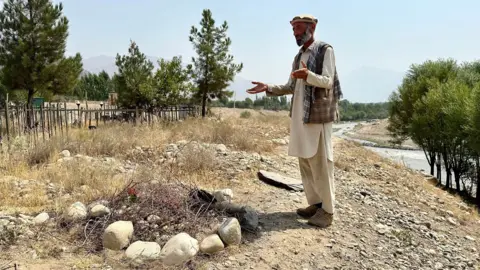 Aakriti Thapar / BBC
Aakriti Thapar / BBC“I wept and screamed. My spouse and baby might’ve been saved if the clinic was open,” mentioned Abdul. “We had a tough life, however we had been dwelling it collectively. I used to be at all times pleased after I was along with her.”
He does not also have a picture of Shahnaz to carry on to.
There isn’t any certainty the mom and child would’ve survived in the event that they’d been handled on the clinic, however with out it, they did not stand an opportunity, underlining the plain affect of US support cuts in Afghanistan.
For many years, America has been the biggest donor to Afghanistan, and in 2024, US funds made up a staggering 43% of all support coming into the nation.
The Trump administration has justified withdrawing it, saying there have been “credible and longstanding issues that funding was benefiting terrorist teams, together with… the Taliban”, who govern the nation. The US authorities additional added that they had reports stating that not less than $11m had been “being siphoned or enriching the Taliban”.
The report that the US State Division referenced was made by the Special Inspector General for Afghanistan Reconstruction (SIGAR). It mentioned that $10.9m of US taxpayer cash had been paid to the Taliban-controlled authorities by companions of USAID in “taxes, charges, duties, or utilities”.
The Taliban authorities denies that support cash was going into their arms.
“This allegation will not be true. The help is given to the UN, and thru them to NGOs in provinces. They establish who wants the help, they usually distribute it themselves. The federal government will not be concerned,” mentioned Suhail Shaheen, the top of the Taliban’s political workplace in Doha.
The Taliban authorities’s insurance policies, particularly its restrictions on girls, the harshest on the planet, have meant that after 4 years in energy, it’s nonetheless not recognised by many of the world. It is also a key purpose donors have been more and more strolling away from the nation.
The US insists nobody has died due to support cuts. Shahnaz and her child’s deaths will not be recorded wherever. Neither are numerous others.
The BBC has documented not less than half a dozen first-hand, devastating accounts in areas the place USAID-supported clinics have shut down.
Proper subsequent to Shahnaz’s grave, villagers who had gathered round us pointed to 2 different graves. They advised us each had been of girls who died in childbirth prior to now 4 months – Daulat Begi and Javhar. Their infants survived.
Not removed from the graveyard, we met Khan Mohammad whose spouse, 36-year-old Gul Jan, died in childbirth 5 months in the past. Their child boy Safiullah died three days later.
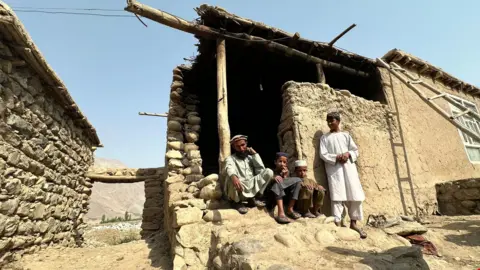 Aakriti Thapar / BBC
Aakriti Thapar / BBC“When she grew to become pregnant, she would go to the clinic for check-ups. However halfway via her being pregnant it shut down. In the course of the supply she had a variety of ache and blood loss,” Khan Mohammad mentioned. “My kids are unhappy on a regular basis. Nobody can provide them the love of a mom. I miss her on daily basis. We had a candy and loving life collectively.”
A roughly five-hour drive from Shesh Pol, in Cawgani, one other village the place a USAID-backed clinic closed down, Ahmad Khan, the grief-stricken father of Maidamo confirmed us the room of their mud and clay residence the place she died giving delivery to child Karima.
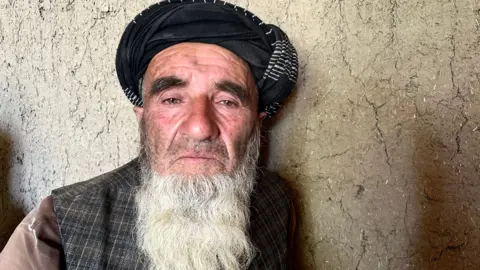 Aakriti Thapar / BBC
Aakriti Thapar / BBC“If the clinic had been open, she might need survived. And even when she had died, we’d not have had regrets understanding the medics tried their greatest. Now we’re left with remorse and ache. America did this to us,” he mentioned, tears rolling down his face.
In one other residence just a few lanes away, Bahisa tells us how terrifying it was to provide delivery at residence. Her three different kids had been born within the Cawgani clinic.
“I used to be so scared. Within the clinic, we had a midwife, medicines and injections. At residence I had nothing, no painkillers. It was insufferable ache. I felt like life was leaving my physique. I grew to become numb,” she mentioned.
Her child woman, named Fakiha, died three days after she was born.
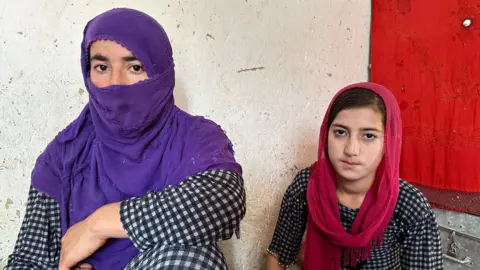 Aakriti Thapar / BBC
Aakriti Thapar / BBCThe closure of clinics in villages has resulted in a surge of sufferers on the maternity ward of the primary regional hospital within the provincial capital Faizabad.
Attending to it, via Badakhshan’s treacherous panorama is dangerous. We had been proven a horrifying picture of a new child child, who was delivered on the best way to Faizabad, and whose neck snapped earlier than he acquired to the hospital.
We had visited the hospital again in 2022, and whereas it was stretched then, the scenes we noticed this time had been unprecedented.
In every mattress, there have been three girls. Think about having gone into labour, or simply having gone via a miscarriage, and never even having a mattress to your self to lie in.
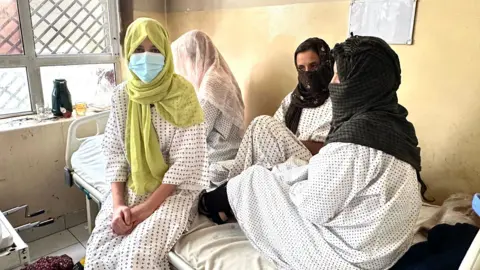 Aakriti Thapar / BBC
Aakriti Thapar / BBCIt is what Zuhra Shewan, who suffered a miscarriage, needed to endure.
“I used to be bleeding severely and did not also have a place to take a seat. It was actually laborious. By the point a mattress is free, a girl might die bleeding,” she mentioned.
Dr Shafiq Hamdard, the director of the hospital, mentioned: “We now have 120 beds within the hospital. Now we have admitted 300 to 305.”
Whereas the affected person load is swelling, the hospital, too, has confronted sharp cuts in its funding.
“Three years in the past our annual finances was $80,000. Now we’ve got $25,000,” Dr Hamdard mentioned.
By August this yr, there had been as many maternal deaths recorded as there have been for the entire of final yr. Which implies that at this price, maternal mortality might enhance by as a lot as 50% over final yr.
New child deaths have already elevated by roughly a 3rd prior to now 4 months, in contrast with the beginning of the yr.
Razia Hanifi, the hospital’s head midwife, says she’s exhausted. “I’ve been working for the previous 20 years. This yr is the hardest, due to the overcrowding, the scarcity of assets and the scarcity of educated workers,” she mentioned.
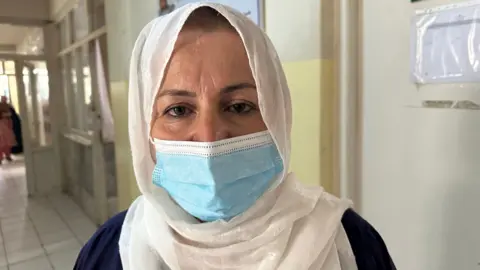 Aakriti Thapar / BBC
Aakriti Thapar / BBCHowever no reinforcements are coming due to the Taliban authorities’s restrictions on girls. Three years in the past, all increased schooling, together with medical schooling was banned for girls. Lower than a yr in the past, in December 2024, coaching for midwives and feminine nurses was additionally banned.
At a discreet location, we met two feminine college students who had been halfway via the coaching when it was closed. They did not wish to be recognized for concern of reprisal.
Anya (identify modified) mentioned they each had been in graduate programs at college when the Taliban took over. When these had been closed in December 2022, they started midwife and nursing coaching, because it was the one path left to getting an schooling and a job.
“When that was additionally banned, I grew to become depressed. I used to be crying day and night time, and I wasn’t in a position to eat. It is a painful scenario,” she mentioned.
Karishma (named modified) mentioned: “There’s already a scarcity of midwives and nurses in Afghanistan. With out extra being educated, girls can be pressured to provide delivery at residence which is able to put them in danger.”
We requested the Taliban authorities’s Suhail Shaheen how they will justify bans which successfully curb entry to well being for half the inhabitants.
“It’s our inner concern. These are our points, the way to deal with them, the way to contemplate them, the way to take choices, that is one thing inner. That’s as much as the management. Primarily based on the wants of the society, they may take a choice,” he mentioned.
With their entry to medical companies severely restricted, by wave after wave of crushing blows, for Afghanistan’s girls, their proper to well being, and life itself, is at grave threat.
Extra reporting, images and video: Aakriti Thapar, Mahfouz Zubaide, Sanjay Ganguly
High picture reveals Abdul along with his daughter and son in Shesh Pol.


